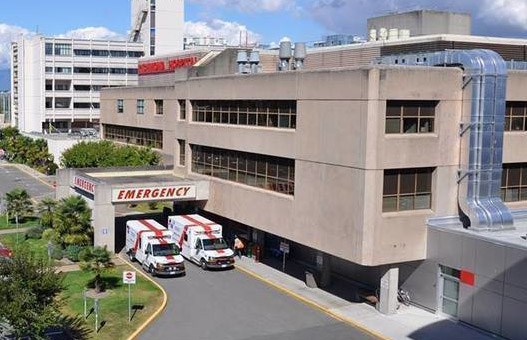The Richmond Hospital Foundation said it’s willing to raise $40 million of the $283 million needed for a new north tower, which is overcrowded and at risk of collapse in a moderate earthquake.
“We need a new, acute care tower to replace the existing original tower built in 1966,” said the foundation’s CEO Natalie Meixner, who is appealing for the provincial government to fund the difference.
“The old tower was never built to withstand earthquakes. In the case of a moderate to strong earthquake, it would collapse or be subject to liquefaction.”
According to a 2005 seismic report of the hospital, the north (acute care) tower would likely collapse, or partially collapse with “moderate shaking.” This fact was reiterated to Vancouver Coastal Health (VCH) in a 2011 report.
Meixner warns that any localized earthquake, of 6.0 or higher on the Richter scale, would jeopardize the lives of anyone inside the tower.
Despite the reports and her foundation’s advocacy for a new facility, Meixner told Richmond city councillors on Monday that her appeals to local MLAs are “not moving quickly enough.”
She asked councillors to advocate, however symbolically, for a new tower, which they have done, via a resolution to write to the B.C. government.
Aside from the seismic risks, the acute care tower is also overflowing with patients. “Our city’s growth has outpaced Richmond Hospital’s capacity,” said Meixner.
Richmond had 50,000 residents and 132 beds in 1966. Now the city has about 215,000 residents and 223 funded beds.
A growing seniors population is also a concern of Meixner — by 2030, Richmond will have about 65,000 seniors; right now it only has about 30,000.
The tower is preventing modern healthcare standards from being delivered, said Meixner, noting patients often find themselves in the hallway.
Furthermore, the tower has old rooms that accommodate four people, whereas new healthcare standards typically mean one patient to a room, to prevent spread of disease, noted Meixner.
Needed upgrades at Lions Gate Hospital, she added, recently skipped ahead of Richmond in the VCH priority line, with the help of a $25 million private donation.
Unlike items such as schools, roads and parks, healthcare gets no funding from municipal development.
VCH spokesperson Gavin Wilson told the Richmond News a new tower, if approved today, would take about seven years to complete, at an estimated cost of up to $283 million.
Wilson said the VCH board has approved a new tower concept and the next step is to get approval from the Ministry of Health.
It’s unclear why it has taken 11 years to only get to the discussion stage of a new tower.
That question was posed to Richmond-Steveston MLA John Yap, who told the News he was aware of the hospital’s seismic reports and has been in talks with VCH.
“I understand one of the issues (at the hospital) is the seismic status of the buildings. By and large, the buildings in the VCH region are up to standard,” said Yap.
When asked about the delay, Yap said: “Healthcare is a major investment... Investments in hospitals continues to grow.”
When asked who is responsible in the event of a tower collapse, Yap said: “No one can really predict when an earthquake will happen, but clearly it’s an issue all are mindful of.”
Yap said no concrete costs have been determined for the tower, but an estimated $12 million seismic upgrade wasn’t feasible; he said he’d prefer a new tower.
On Monday, Coun. Bill McNulty questioned Premier Christy Clark’s infrastructure priorities.
“She’s given us a bridge but we want a hospital,” said McNulty.
Yap said the bridge and the hospital are both important, but the province chose to build a bridge first because congestion was “a drag on economic opportunities.”
New hospital towers across B.C.
Kelowna General (2012) – $218 million
Surrey Memorial (2014) - $512 million
Penticton Regional (planned) - $325 million



